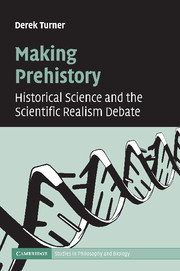Book contents
- Frontmatter
- Contents
- List of figures
- Acknowledgments
- Introduction
- 1 Asymmetries
- 2 The colors of the dinosaurs
- 3 Manipulation matters
- 4 Paleontology's chimeras
- 5 Novel predictions in historical science
- 6 Making prehistory: could the past be socially constructed?
- 7 The natural historical attitude
- 8 Snowball Earth in the balance
- Conclusion
- References
- Index
3 - Manipulation matters
Published online by Cambridge University Press: 22 September 2009
- Frontmatter
- Contents
- List of figures
- Acknowledgments
- Introduction
- 1 Asymmetries
- 2 The colors of the dinosaurs
- 3 Manipulation matters
- 4 Paleontology's chimeras
- 5 Novel predictions in historical science
- 6 Making prehistory: could the past be socially constructed?
- 7 The natural historical attitude
- 8 Snowball Earth in the balance
- Conclusion
- References
- Index
Summary
In this chapter, I turn from questions about the scope of scientific knowledge to questions about the possibility of scientific knowledge. I also turn from the role asymmetry of background theories, which was the main theme of Chapter 2, to the asymmetry of manipulability. What are the main arguments that philosophers have used to try to establish the possibility of scientific knowledge of unobservables? And how does the asymmetry of manipulability affect those arguments?
Let us say that minimal epistemic realism with respect to some kind K of unobservables is the view that it is possible to have scientific knowledge of unobservables of that kind. In this chapter, I will argue that past events, entities, and processes, on the one hand, and tiny events entities and processes, on the other, constitute two kinds of unobservables. There is a relevant difference between these two kinds of unobservables that has a bearing on the arguments for minimal epistemic realism: We cannot manipulate the past, but we can often manipulate the tiny. This difference has the consequence that the standard arguments for minimal epistemic realism give less support to minimal epistemic realism with respect to one kind of unobservables, than to realism with respect to the other.
- Type
- Chapter
- Information
- Making PrehistoryHistorical Science and the Scientific Realism Debate, pp. 61 - 84Publisher: Cambridge University PressPrint publication year: 2007

